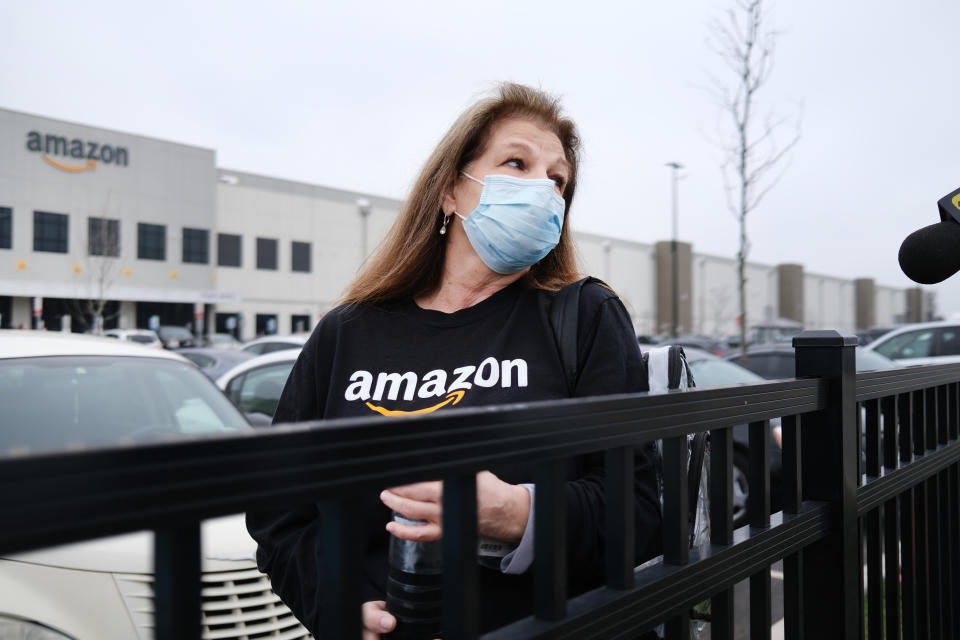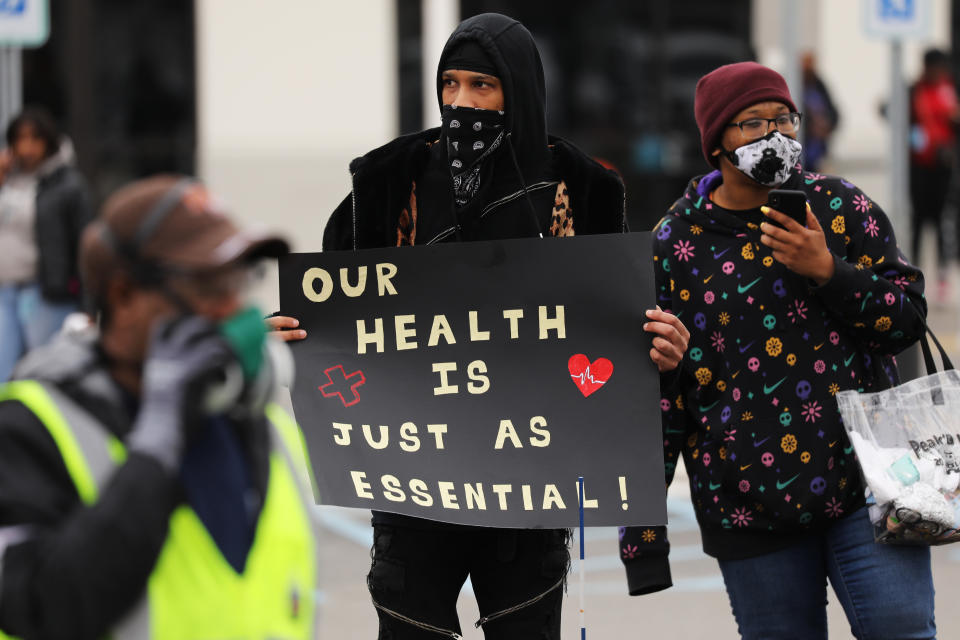'We're risking our lives': Why Amazon warehouse workers are walking out over coronavirus fears
The novel coronavirus outbreak has forced hundreds of millions of Americans into their homes, spurring Amazon (AMZN) to hire 100,000 warehouse workers amid growing e-commerce demand — but current employees at its massive facilities say they’re scared of contracting the disease and putting their lives at risk.
On Monday, workers at a warehouse in Staten Island, New York — where an employee tested positive for coronavirus last week — dramatically escalated a campaign for improved safety measures at the facility, walking off their jobs during a shift. More than 60 workers participated in the walkout, according to New York Communities for Change, an advocacy group that has helped organize workers at the facility.
Workers at Amazon warehouses nationwide in recent weeks have accused the company of having inadequate safety measures and insufficient paid sick leave. Amazon has rebutted the criticism, pointing to enhanced cleanings the company has conducted at some warehouses and paid sick leave it has made available for all employees diagnosed with coronavirus, among other steps taken to address the health risks.

“We work for one of the richest men in the world and we don’t have appropriate safety equipment,” says Rina Cummings, 38, who has worked at the Staten Island warehouse since it opened in September 2018 and has noticed many coworkers who haven’t been coming to work lately. “It’s ridiculous.”
Cummings, who lives with two children ages 3 and 15, said she left work early during a shift on Saturday out of fear of contracting the coronavirus.
“I can’t afford to get sick and bring it home from work,” she says, noting that the company had not provided her with a mask. “Sometimes people are sneezing and coughing. This equipment is supposed to be there.”
Amazon is working with global suppliers to acquire masks, the company said, adding that the limited quantities available are being given to people who have roles in public engagement.
‘We’re risking our lives’
The workers are demanding up-to-date information about infections at the facility and how Amazon intends to address them, as well as paid sick leave for all employees, a temporary closure of the facility for cleaning during which the workers receive full pay, and childcare for workers who now have kids at home from school, Cummings said. The warehouse is 855,000 square feet and has 4,500 workers.
As of last Wednesday, workers at ten 10 different Amazon facilities had tested positive for the coronavirus, the Washington Post reported. The company has more than 110 fulfillment centers in North America, according to its website. The warehouse in Staten Island is one of the company’s largest urban facilities, the Verge reported last year.
“We’re risking our lives every day,” says Phillip Ruiz, 34, another worker at the Staten Island warehouses.
The walkout on Monday appeared to be part of a growing wave of worker action, as Instacart’s grocery delivery workers also walked off the job and Whole Foods workers planned to hold a “sick out” on Tuesday, vowing to skip work unless safety risks are addressed. Whole Foods is owned by Amazon.

In a statement, Amazon rejected claims that its warehouse workers face unsafe conditions.
“These accusations are simply unfounded. Our employees are heroes fighting for their communities and helping people get critical items they need in this crisis. Like all businesses grappling with the ongoing coronavirus pandemic, we are working hard to keep employees safe while serving communities and the most vulnerable,” the statement says.
“We have taken extreme measures to keep people safe, tripling down on deep cleaning, procuring safety supplies that are available, and changing processes to ensure those in our buildings are keeping safe distances. The truth is the vast majority of employees continue to show up and do the heroic work of delivering for customers every day,” she adds.
Workers at the Staten Island warehouse recently received a $2 raise and the company has implemented daily temperature screenings at the facility, Amazon said. Employees diagnosed with coronavirus or placed into quarantine will receive up to two weeks of full pay, in addition to unlimited unpaid time off during the month of March, the company added.
Ruiz, who has worked at the warehouse in Staten Island for about one year, has not returned to work for a month out of fear he’ll become sick and spread the disease to his 78-year-old father, with whom he lives.
He said he hopes Amazon customers understand the dangers of the work that goes into sending them their purchases.
“Think about what goes into getting their packages as far as what workers have to deal with, and us not having enough equipment,” he says.
He applauded the walkout on Monday over the company’s coronavirus response.
“Complaining about it ain’t going to do anything unless we do something about it,” he says. “I’m glad we’re taking action to back up those words.”
Read more:
